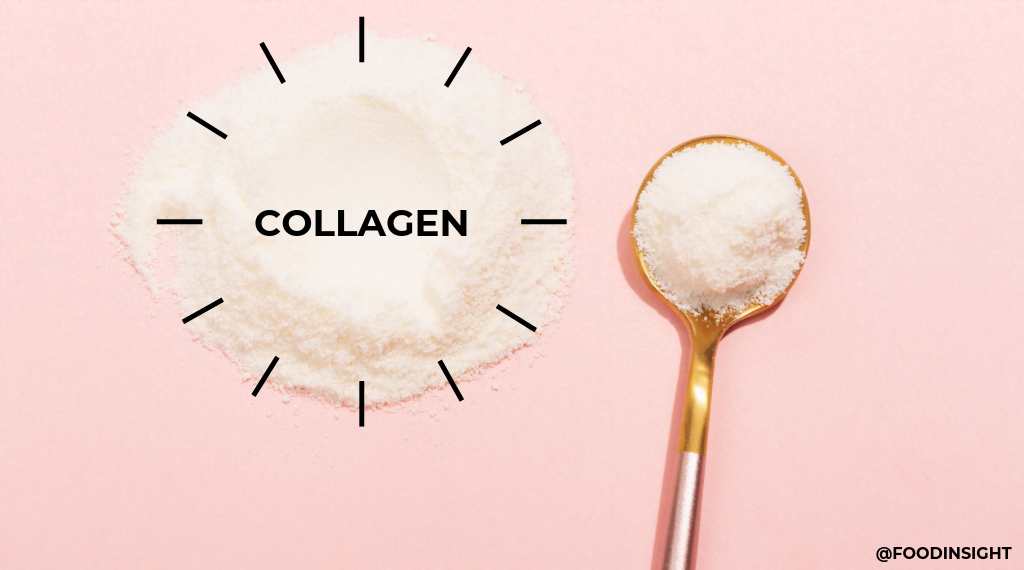
Collagen has seemed to explode as a trend overnight, and many consumers are wondering if the touted benefits are legitimate or all hype. In this article, we explore what collagen is, where it’s found, and what the research says about its potential benefits to our health.
What is collagen?
Collagen is the most abundant protein in the body. It’s a main component of our bone, skin, muscle and ligament structure. There are several types of collagen, but types I, II and III are most common in the human body. Type I accounts for most of our collagen and is made of densely packed fibers needed for teeth, bones, ligaments, skin and connective tissue. Type II is found in elastic cartilage, which provides joint support. Type III is found in the structure of muscles, arteries and organs. As we grow older, our bodies produce less collagen, which may contribute to aging skin and wrinkles. Lifestyle factors such as smoking and too much sun exposure may also damage collagen production.
Food sources and supplements
Collagen can’t be absorbed by the body in its whole form. This means collagen proteins must be broken down into smaller peptides or amino acids before they can be absorbed. Collagen supplements are typically already broken down into peptides of two or three amino acids for the purpose of increasing their bioavailability. These collagen peptides are then absorbed through the gastrointestinal tract. It’s important to note that collagen supplements are not regulated by the Food and Drug Administration, and manufacturers don’t have to prove that they’re effective or safe before putting them on the market.
In addition to supplements, collagen is found in food, with bone broth being the richest source. Any meat that contains connective tissue is a good source of collagen as well. Since collagen is produced by our bodies from amino acids and cannot be absorbed in its whole form, plant and animal protein sources both can provide the raw materials needed for adequate collagen production.
Interestingly, we are not able to decide where collagen peptides (from a supplement or food) end up in our body. These peptides could be used to create collagen, but they could also be used for other proteins. Our bodies are smart in this way—they prioritize whatever need is most pressing.
What does the research say?
Most of the research conducted on collagen supplementation has been on its effects on skin and joint health. While larger, more conclusive studies are needed, some small studies have seen beneficial results. A double-blind, randomized, placebo-controlled clinical trial was conducted on 120 subjects who consumed either a collagen-containing test product or a placebo on a daily basis for 90 days. Those who consumed the collagen supplementation reported improved skin elasticity compared with the placebo group. Additionally, the same participants also reported decreased joint pain and improved joint mobility. However, while collagen supplementation may modestly improve skin elasticity, there is no strong scientific evidence to support that collagen supplements—in any form—can treat or reverse the natural aging process.
In addition to skin and joint pain, emerging research has investigated the effect of collagen supplementation on osteoarthritis (OA). In this 2019 meta-analysis of randomized placebo-controlled trials, researchers evaluated the effect of orally administered collagen on OA symptoms using the Western Ontario and McMaster Universities Osteoarthritis Index (WOMAC) scale and/or the Visual Analog Scale (VAS). The results of this meta-analysis showed that collagen is effective in improving OA symptoms by the decrease of both total WOMAC index (particularly for stiffness) and VAS score. Still, the current American College of Rheumatology/Arthritis Foundation guidelines do not include collagen supplementation as a method for management of OA.
Should you be taking collagen or not?
Collagen supplementation may be useful for certain populations; however, as with many nutrition trends, its broad benefit has likely been over-hyped in the media. Despite promising results in small research studies, it remains uncertain whether the benefits found were specifically from a collagen supplement or if adequate protein intake would have achieved similar results. Additionally, it’s important to reiterate that we cannot decide what collagen peptides will be used for in the body. While supplementation may not be harmful, adequate protein intake (from plant and/or animal sources) should provide enough amino acids to synthesize sufficient collagen without the need for a supplement. If you have trouble getting enough protein in your diet, find a registered dietitian in your area to help you seek food options that work best for you.
This blog post includes contributions from Ali Webster, PhD, RD.
